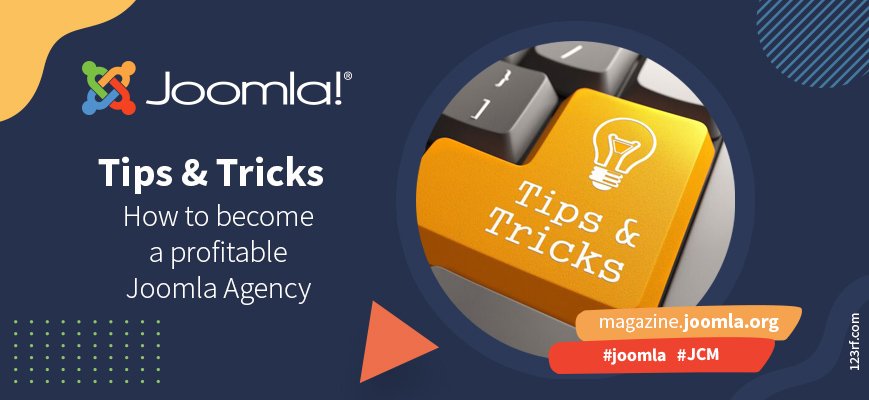Ways to become more profitable as a Joomla! agency
Hi, I’m Eoin Oliver and I welcome you to my first ever magazine article. This is a follow up from my talk at Joomla! Day USA titled “50 useful non-Joomla tools”. I’ve broken this into a two part article, this first article will talk about ways to make your agency more profitable, and focus on our process.
Part 2 will focus on the 50 Joomla! tools you could use (and we use) in your agency. These tools can also make you more profitable, and I will try to show some of the methods we use with these tools to give you an idea of your anticipated success rate.
In my Joomla Day USA talk, I covered lots of things from marketing, design and pretty much anything outside of building a Joomla website, with a few design tips to help you to improve your Joomla website design only without talking about implementation.
The aim was to help you with your Joomla! based business to become more profitable and to help you to help your clients who have Joomla! based websites.
If you attended Joomla! Day USA but missed the talk you can watch the video here:

Who am I? Why should you listen?
So, first things first, why should you listen to me? Who am I? What right do I have to tell anyone about anything? Well, I don’t really, but here’s my experience, and you can decide whether you want to listen to me.
I’ve been running my Joomla! based web dev business for 15 years. And I also have another business that was started purely to raise money for charity and foster a greater community. This business is a music events business for charity (The Baseline Collective). And I’ve learned different things from each business.

In that time, I have:
- Completed many SEO campaigns, and we’re still running them. Albeit my small team mainly does the work, I’m still involved quite heavily.
- Ran organic social media campaigns. Who says organic is dead? 8,000 views a month on our posts.
- Ran paid social media campaigns (a bit too technical to give away in my talk but I have included some videos in this blog so you have some additional benefit even if you saw the original talk). £0.002 cost per result on video views. £0.03 cost per click.
- Ran Google Ads campaigns. And I’ve seen costs per click ranging from £50 to £0.20.
- Ran TikTok campaigns. £30 got me 10,000 views.
- Ran email campaigns and developed HTML emails. And the customers say they got good results, so who am I to argue?
- Built plenty of websites (and yes, usually with Joomla).
- Talked on Joomla! podcasts (I was grateful to be asked to speak on the pilot episode).
- Talked at Joomla! events, often on marketing, design or front-end development.
- Even released a tutorial about the Joomla! 4 Webservices API on the official Joomla! YouTube Channel.
- Learned a lot about salesmanship. I often refer to myself as part of the elite selling crew (if you haven’t seen the TV series Phoneshop, that reference will be wasted on you. I highly recommend you watch it).
- Learned bits about project management.
- Learned bits about productivity tools.
- And had plenty of ups and downs along the way. Can’t have the ups without the downs people, downs are for learning, and ups are for loving.
So, whilst I admit I don’t know everything (sometimes), I do know some things, and I like helping people.
So, hopefully, from my knowledge, you can gain something useful and apply it to your own business and become more profitable.
Feel free to stalk me here: https://linktr.ee/squareballoon, or for the more adventurous, feel free to follow my Instagram journey to becoming a fake influencer.

DISCLAIMER:
I talk about and link to a lot of 3rd party tools in this article mini-series. When I have a suggestion, I make it. This is based on personal opinion and preference as well as habit, or in some cases blind loyalty. Please do your own research and make the best decision for you, your business and your clients, and please do tell me if you find better tools. I want to make it clear that I have no affiliation with any of the products other than personal preference. None of the links are currently affiliate links yet. But I think they should be so perhaps one day the project will add them. In short… both articles attempt to be unbiased but probably contain biases. It’s my personal opinion.
So how can you become more profitable?
Well… if you do more stuff… you can charge more money. So do more of the doings. And the easiest thing is to do more things for the customers you already have. And the easiest way to do that is to do more of the things they want, and things that are directly related to your existing business as they are easier to sell. But what sort of doings, I hear you muse?

Going through the discovery process, for a start. And charge for it.
But how can I charge just to discover what the customer needs me to do? Why would they pay? They just want a quote. They won’t pay for the quote. Nobody else is charging for the quote.
In some cases that is certainly true. And in other cases that’s most certainly you limiting yourself with your beliefs or your experience of smaller customers.
Now here’s the secret. Even the customers who go through the discovery process want to know at least a ballpark figure before they start. And it’s your job to help them get there. Or, as I prefer to think of it: it’s your job to understand what their budget is and quote correctly for what they need within their budget.
Isn’t it fair to say that if a customer has a £50,000 budget and expects a very successful website, it is unreasonable of you to spend a few hours on it and charge £2,000? And not consider ongoing SEO, and marketing, and ads? Not consider a bespoke template or going through a longer process of discovering who their customers are and what their needs are?
And wouldn’t it be fair to say if a customer had a £40 budget, you would be better to save yourself the time from quoting and tell them you cannot create a website for that amount? But perhaps in that case you could refer them to a self build like Wix. But if you are going to do that, why not find someone who will pay you as an affiliate? Then you still make money from your lead.
And wouldn’t it be fair to say if the customer had £3,000 for a website that might be ok, but you would still want to know whether it is 1 page or 20 pages? And if they wanted custom illustrations and videos and photography?
And isn’t it also fair to say if the same customer needed bespoke software that would take a team of 20 people two years to build that £50,000 may not be enough and you would have to ask what can be cut out of the project to deliver at least something for them?
Well, that’s what discovery is. You finding out what the customer needs. Because they probably don’t know their budget and they probably don’t know how long anything takes. So you need to find out which type of customer they are, what their expectations are, and what their budget is.
Because if you are trying to work out something that needs 20 people over 2 years to do, that will be at least a couple of weeks of work just to understand the starting requirement. That shouldn’t be unpaid work, you have to charge for it. You charge to discover what they need so you can quote accurately.
But what you need to do is give a ballpark figure so you know if they can afford you. I once met James Newell from Clear Sales Message, he’s a master of sales. And he said something that really stuck with me. “If the first time your customer is learning about the price is when they see the proposal, you’re doing it wrong”. And he was right!
I used to think that if the customer didn’t have the information they couldn’t make a decision on buying. I used to think they needed to see my full proposal so they could see the value of what I was offering, my past clients, my accreditations and successes, without all of that they would make a decision based on cost alone.
BUT… they only ever skipped through all my proposals to the price page anyway. And I hate writing proposals. It takes ages and then I don’t even hear from the customer, and then they decide to use someone else. Without even letting me know. Nightmare.
James’ point was: if you discuss price before you quote, they may object, but you will be talking to them. You will have a chance to overcome those objections. Perhaps they say I don’t want to pay £4,000 and you reply with “it’s at least a month's work”. And they say “oh, I had no idea”. Without that conversation they just go and get other quotes. And some schmuck does the job badly for a fraction of the price and 3 years later the website isn’t built and they are unhappy.
Perhaps they say they can’t afford it and you work out a way to reduce the amount of work you do. And then there’s absolutely no reason the price can’t come down. No reason at all. And they are happy and you are happy and the deal gets done. And you don’t have to spend half a day updating the nice proposal you wrote for the £4,000 website because you’re now doing a £3,000 website.
So, before you even start discovery… give them a ballpark. “I think this project will be between £10,000 and £30,000. But we’ll have to go through discovery first to finalise that cost. Discovery will cost £2,000”.
The most important thing about discovery is that it is a document they can keep. If they use a different provider that document should clearly outline exactly what is required for this project. They are paying for something and will receive something. Sometimes I even offer to knock the discovery off the price if they decide to go ahead with the project afterwards.
How can you quote if you don’t know what you are building? You can’t. And your customers probably don’t know. Am I right? How often do your customers come to you with a really clear idea of what they want? Most of the time they don't, right? They are looking at you, for your expertise to guide them. So charge for discovery even if you give them a ballpark before you start. Discovery has to be a part of your process.
You can also charge for your process…

You can charge for a sitemap. Yes, that’s right.
The first thing you can charge for is mapping out a sitemap. Remember, the customer is paying for something, they need something to take away. If you part ways they have a document. It could be a Google Doc or a Word Document but where’s the real value in that?
I prefer to start with wireframes using a free tool like Miro.
Here’s an example. https://miro.com/app/board/uXjVP4a2drc=/?share_link_id=671470872393
Can you see how much more valuable this is than simply a bullet list in a Word document? It’s very hard to charge for a bulleted list in a Word document, but you’re also doing them a disservice by not spending more time thinking about it.
I can do a Zoom call with my client and talk them through why things are where they are. I put X here next to Y because I think that will help conversions. Don’t worry about the design here, we are just talking about where things go and why. Is anything missing here? Should we add anything? Are we giving the clients the right info? Are we using all the correct trust factors? What other pages are required?
Make sure you get a written sign off at this point via email or similar so the customer knows anything else is a change request. Because you will become more profitable if you have a very specific brief and there are no grey areas and you can charge for the extras. If they ask for a new page, it’s very clear that wasn’t what you cost. You can’t really know the cost of a website build unless you know how many pages there are. But you could offer packages “up to 10 pages for £X”.

You can charge for design & mock-ups
Ok so now we have the sitemap and wireframes we can charge for the design/mock-ups. Although I recommended quite a few tools, the one I’ve started working with is Penpot. It’s an Open Source tool so it’s worth supporting their project. And it’s free. It’s not as good as Figma, although I believe that is going downhill so I’m prepared to invest my time into Penpot for now. Although it’s not perfect, it’s still pretty good.
The best thing about this approach is that we have a very clear design, layout, and number of pages. Anything changing after this is chargeable. It’s also easy to see a clear end to this stage. And the client is happy to sign off. Which means… you can invoice for this phase. By doing a phased approach you can invoice more regularly rather than for example 50% up front and 50% on completion which leaves too much risk on your plate instead of the customer’s. Get paid as you do the work. Charge before phase 1, 2, 3, 4, 5. You leave less money on the table if the client does a runner and you can stop working as you were paid before the phase.

Now you build
This isn’t something I’m going to massively cover in this talk because this is about non-Joomla tools but I would HIGHLY recommend Elisa’s talk which you can find here if you were at the event, or if you weren’t you will have to wait 6 months or so until they make it publicly available. https://jdayusa.com/sessions/sessions-2023/session-2023/april-22/slot-2-6/yootheme-pro-workshop
Conclusion
That’s the end of this article, but don’t forget I have a part 2 with a list of great tools to make you and your customers more efficient. I hope you got value from this article, and I would love to hear how some of you have implemented the changes in the comments. If anyone has a different or better process it would be great to hear it, we can all benefit from discussions like this. If you would like to expand on any of the topics covered let me know and I will endeavour to write or video something at some point.
By accepting you will be accessing a service provided by a third-party external to https://magazine.joomla.org/

Comments